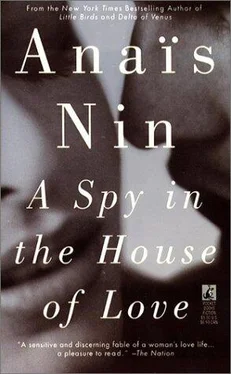On the stained mirror stood the shadow and echo of her mother, carrying food. Wearing the neutral-toned clothes of self-effacement, the faded garments of self-sacrifice, the external uniform of goodness.
In this realm, her mother’s realm, she had found a moment’s surcease from guilt.
Now she knew what she must say to Donald to cure his sense of smallness, and the smallness of what he had given her. She would say to him:
“Donald! Donald! You did give me something no one else could give me, you gave me my innocence! You helped me to find again the way to gain peace which I had learned as a child. When I was a child, only a little younger than you are now, after days of drugging myself with reading, with playing, with fantasies about people, with passionate friendships, with days spent hiding from my parents, with escapes, and all the activities which were termed bad, I found that by helping my mother, by cooking, mending, cleaning, scrubbing, and doing all the chores I most hated, I could appease this hungry and tyrannical conscience. It’s no crime that you have remained a child, Donald. In some of the old fairy tales, you know, many mature characters were shrunk back into midgets, as Alice was made small again to re-experience her childhood. It’s the rest of us who are pretenders; we all pretend to be large and strong. You just are not able to pretend.”
When she entered his room, she found a letter on her table.
Once she had said to him, when his moods had been too contradictory: “Adolescence is like cactus,” and he had answered: “I’ll write you a letter some day, with cactus milk!”
And here it was!
Letter to an actress: “From what you told me last night I see that you do not know your power. You are like a person who consumes herself in love and giving and does not know the miracles that are born of this. I felt this last night as I watched you act Cinderella, that you were whatever you acted, that you touched that point at which art and life meet and there is only BEING. I felt your hunger and your dreams, your pities and your desires at the same time as you awakened all of mine. I felt that you were not acting but dreaming; I felt that all of us who watched you could come out of the theatre and without transition could pass magically into another Ball, another snowstorm, another love, another dream. Before our very eyes you were being consumed by love and the dream of love. The burning of your eyes, of your gestures, a bonfire of faith and dissolution. You have the power. Never again use the word exhibitionism. Acting in you is a revelation. What the soul so often cannot say through the body because the body is not subtle enough, you can say. The body usually betrays the soul. You have the power of contagion, of transmitting emotion through the infinite shadings of your movements, the variations of your mouth’s designs, the feathery palpitations of your eyelashes. And your voice, your voice more than any other voice linked to your breath, the breathlessness of feeling, so that you take one’s breath away with you and carry one into the realm of breathlessness and silence. So much power you have Sabina! The pain you felt afterwards was not the pain of failure or of exhibitionism, as you said, it must be the pain of having revealed so much that was of the spirit, like some great mystic revelation of compassion and love and secret illusion, so that you expected this to have been communicated to others, and that they should respond as to a magic ritual. It must have been a shock when it did not happen to the audience, when they remained untransformed. But to those who respond as I did, you appear as something beyond the actor who can transmit to others the power to feel, to believe. For me the miracle took place. You seemed the only one alive among the actors. What hurt you was that it was not acting, and that when it ended there was a break in the dream. You should have been protected from the violent transition. You should have been carried off the stage, so that you would not feel the change of level, from the stage to the street, and from the street to your home, and from there to another party, another love, another snowstorm, another pair of gold slippers.
“It must take great courage to give to many what one often gives but to the loved one. A voice altered by love, desire, the smile of open naked tenderness. We are permitted to witness the exposure of all feelings, tenderness, anger, weakness, abandon, childishness, fear, all that we usually reveal only to the loved one. That is why we love the actress. They give us the intimate being who is only revealed in the act of love. We receive all the treasures, a caressing glance, an intimate gesture, the secret ranges of the voice. This openness, which is closed again as soon as we face a partial relationship, the one who understands only one part of us, is the miraculous openness which takes place in whole love. And so I witnessed, on the stage, this mystery of total love which in my life is hidden from me. And now, Sabina, I cannot bear the little loves, and yet I cannot claim all of yours, and every day I see you now, immense, complete, and I but a fragment, wandering…”
Sabina touched the letter which rested on her breast, the sharp corners of the pages hurting her a little… “What can I give you?” he asked. “What have I to give you?” he cried out in anguish, thinking this was the reason why he had not seen her for three days, or heard from her. Another time he had said playfully: “I can only nibble at you.” And had pressed his small, perfect teeth into her shoulder.
The ascensions of the ballet dancers into space and their return to the ground, brought before her eyes a Japanese umbrella made of colored paper which she once wore in her hair. It was lovely to see, so delicately made. When it rained and others opened their umbrellas then it was time for her to close hers.
But a hi wind had torn it, and when she went into Chinatown to buy another the woman who ran the shop shouted violently: “It’s made in Japan, throw it in the gutter!”
Sabina had looked at the parasol, innocent and fragile, made in a moment of peace by a workman dreaming of peace, made like a flower, lighter than war and hatred. She left the shop and looked down at the gutter and could not bring herself to throw it. She folded it quietly, folded tender gardens, the fragile structure of dream, a workman’s dream of peace, innocent music, innocent workman whose hands had not made bullets. In time of war hatred confused all the values, hatred fell upon cathedrals, paintings, music, rare books, children, the innocent passersby.
She folded the letter, as she had folded the parasol, out of sight of hatred and violence. She could not keep pace with the angry pulse of the world. She was engaged in a smaller cycle, the one opposite to war. There were truths women had been given to protect while the men went to war. When everything would be blown away, a paper parasol would raise its head among the debris, and man would be reminded of peace and tenderness.
Alan always believed he was giving Sabina pleasure when he took her to the theatre, and at first her face was always illuminated with suspense and curiosity. But inevitably she would grow restive and tumultuous, chaotic and disturbed; she would even weep quietly in the dark and disappear in between acts, so as not to expose a ravaged face.
“What is it, what is it?” repeated Alan patiently, suspecting her of envy or jealousy of the roles given to others. “You could be the most marvelous actress of our period if you wanted to give your whole life to it, but you know how you feel about discipline and monotony.”
“It isn’t that, no, it isn’t that,” and Sabina would say no more.
To whom could she explain that what she envied in them was the ease with which they would step out of their roles, wash themselves of it after the play and return to their true selves. She would have wanted these metamorphoses of her personality to take place on the stage so that at a given signal she would know for certain they were ended and she might return to a permanent immutable Sabina.
Читать дальше












